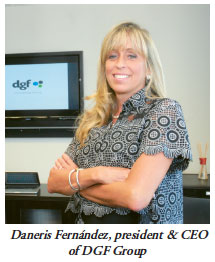P.R. private industry targets Brazil’s big pharma
DGF Group is hosting an investment summit for Brazil’s largest pharmaceutical companies to tout tax breaks and other industrial incentives that make the island the best and cheapest way to enter the U.S. pharmaceutical market. The event, called “The Latin American Economic Congress: Puerto Rico a door to the United States,” will be held Sept. 2-4 in São Paolo’s Federación de las Indústrias convention center.
Brazil represents a world of opportunity for the local pharmaceutical industry since Brazilian pharmaceutical manufacturers make 80% of all medicine the country consumes. This has led to the creation of a host of pharmaceutical giants in Brazil that produce products also made in the U.S. but are sold at far lower cost. This market is far from small since Brazil is the world’s fifth-largest country in terms of population, 202.5 million people, and size, at nearly 3.3 million square miles. Brazilian pharma comprises 540 local and international companies, with sales of $25 billion and annual growth of 15%, reported Brazil’s Pharmaceutical Industry Syndicate (Sindusfarma).
 “Brazilian pharmaceutical companies want to enter the U.S., and many are unaware of the opportunities Puerto Rico provides,” said Daneris Fernández, CEO & president of DGF Group, a local business development consulting group specializing in the healthcare industry, which provides consultation to pharmaceutical companies in Mexico, Brazil and Columbia, among others. “If we get just one or two investments from these companies, the effect on Puerto Rico’s economy will be gigantic. It’s a model for success.”
“Brazilian pharmaceutical companies want to enter the U.S., and many are unaware of the opportunities Puerto Rico provides,” said Daneris Fernández, CEO & president of DGF Group, a local business development consulting group specializing in the healthcare industry, which provides consultation to pharmaceutical companies in Mexico, Brazil and Columbia, among others. “If we get just one or two investments from these companies, the effect on Puerto Rico’s economy will be gigantic. It’s a model for success.”
To date, Brazil’s pharmaceutical exports totaled nearly $1.3 billion last year, Sindusfarma reported.
Puerto Rico poses a particularly good place for Brazilian pharmaceuticals interested in entering the U.S. market because the island can serve as a “boot camp” for Food & Drug Administration (FDA) compliance, has cheaper labor costs and has a host of available state-of-the-art factory buildings, Fernández said. Before setting up her own company two years ago, Fernández served as Merck & Co.’s vice president of Latin American operations. The chemical engineer spent 18 years of her career at Merck.
“All the major players with decision-making power will be there. I’m talking about company owners, CEOs and country managers,” Fernández said of those slated to attend the Latin American Economic Congress. “Emerging economies in Latin America are growing at double digits, and that is the type of growth we want to bring to Puerto Rico.”
Among Brazil’s big pharma slated to attend are executives from EMS, Aché, Medley, Hypermarcas and Eurofarma.
EMS is Brazil’s largest domestic pharmaceutical company, which has a presence in more than 30 countries through joint ventures and strategic partnerships.
Aché is Brazil’s second-largest pharmaceutical group. The company, which has 3,300 employees, manufactures and promotes 285 drugs in 695 different versions including prescription, OTC and generic products.
Medley Indústria Farmacêutica Ltd. is Brazil’s third-largest pharmaceutical company and specializes in generics.
Hypermarcas is a Brazilian consumer goods company that specializes in OTC drugs, healthcare products and cosmetics. Hypermarcas operates five industrial complexes with 13 different production lines in the states of Goias, Santa Catarina, São Paulo and Rio Grande do Sul.
Eurofarma also is among Brazil’s biggest pharmaceutical companies, specializing in prescription, generic and specialized oncology medication, as well as drugs for veterinary purposes.
The Latin American Economic Congress will serve as a forum for pharmaceutical executives to learn about all benefits under Laws 20/22 as well as Law 73, among other industrial incentives, Fernández said.
DGF Group is coordinating the Latin American Congress in conjunction with the Puerto Rico State Department, the Brazilian Pharma Solutions Project for the internationalization of the pharmaceutical sector, Brazilian Pharmaceutical Industry Association, and the U.S. federal government.
Brazil’s main trade groups also are supporting the event. They are the Brazilian Association of Biotechnology & Fine Chemical Industries & their specialties (Abifina); National Association of Pharmaceutical Laboratories (Alanac); Brazilian Generic Drugs Pharmaceutical Manufacturers Association (Interfarma Pró genéricos); and Sindusfarma.
DGF Group set up the Latin American Economic Congress in an effort to find options for economic development for Puerto Rico and the island’s pharmaceutical industry, which has been hard hit by the phaseout of Section 936/30A benefits in 2006, expiration of drug patents, and then taxes on income under Law 154 in 2010, Fernández said.
To date, pharmaceutical employment in Puerto Rico hovers around 20,000 jobs, down from 28,567 in 2005. Such employment was as high as 29,100 in 2004, according to the U.S. Bureau of Labor Statistics Establishment Survey.
Antonio “Tito” Colorado, former Puerto Rico resident commissioner and Economic Development & Commerce secretary, said, “Affluent Latin Americans have greater advantages and flexibility under the benefits posed under Laws 20/22 than even U.S. citizens.”
Brazil, which has a dearth of academic institutions, could also benefit from Puerto Rico’s universities, which are suffering drops in registration because of the island’s aging population, said Colorado, who is among scheduled speakers at the Latin American Economic Congress.
“Puerto Rico has three distinct advantages in terms of education for Brazil: familiarity of culture, ability to learn Spanish and English, and cheaper costs than the mainland U.S or Europe,” Colorado said.
Puerto Rico also is a good entry to the U.S. market for Brazilian pharma because the island has among the largest FDA compliance centers in the U.S. and customs-free access to the mainland, Colorado said, adding the entrance of Brazilian pharma would create jobs for local engineers, doctors and technicians.
“This poses benefits for both Puerto Rico and Brazil,” Colorado said.
Billionaire Nick Prouty, founder & CEO of Putnam Bridge Funding, who moved with his wife and daughter to Puerto Rico a year ago from Greenwich, Conn. to benefit from Law 20/22 incentives, is among those slated to speak at the Latin American Economic Congress. To date, Prouty has invested more than $750 million on the island, including the purchase of the bankrupt La Cuidadela project in San Juan’s Santurce sector and Marina del Rey in Fajardo.
Secretary of State David Bernier; Senate President Eduardo Bhatia; former Health Department Secretary Johnny Rullán; Edgar Ríos, attorney from Pietrantoni, Méndez & Álvarez who developed Laws 20/22; economist Joaquín Villamil; and DGF’s Fernández also are slated to address Brazil’s big pharma at the Latin American Economic Summit.
